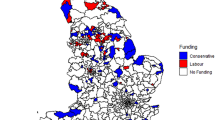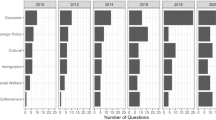Abstract
The 2014 presidential election marked Indonesia’s transition into a mature democratic Islamic country. Joko Widodo, known as Jokowi, was inaugurated as Indonesia’s seventh president, defeated Prabowo Subianto by a margin of 53.1–46.9%, respectively. In the absence of an incumbent, voters evaluated both presidential candidates based on a mix of prospective and retrospective economic performance. This study merges data from the Village Potential Census (PODES) and the crowdsource data (Kawal Pemilu) from vote recap to investigate the existence of economic voting and the effect of socioeconomic conditions at the village level on voting behavior. Our study confirmed that economic access, conditions of infrastructure, and middle-class group played major roles in the Jokowi victory. The middle class tended to choose Jokowi, because his ideology best matched their own. Moreover, social cleavages related to religion and ethnicity are still dominant as villages with a Muslim majority tended to choose Prabowo that was associated with an Islamic representative. Unfortunately, media and black campaigns also significantly influenced voters’ decisions. This evidence provides valuable lessons learned for Indonesians in preparing for a better 2019 presidential election.

Source: Authors

Source: re-drawn from Downs (1957)

Source: authors

Source: modified from Baswedan (2004)

Source: authors comparison
Similar content being viewed by others
Notes
This is possible because the Election Commission (Komisi Pemilihan Umum/KPU) uploaded the C1 document (a document of vote recap at the polling station level) and then Kawal Pemilu (the Election Monitoring Group) conducted a crowdsource to digitize and recapitalize the C1 document from polling station to national level, created alternative election result data beside an official data from KPU. The result from the Kawal Pemilu is only slightly different from KPU (0.14%).
Indonesia Election Tracker, Suara Indonesia (www.facebook.com/FacebookIndonesia).
Serial Tweets by @PolitikaWave, 2014.
A smear campaign is an effort to damage someone’s reputation. A black campaign or propaganda is an effort to damage someone’s reputation by spreading false or incorrect information, while a negative campaign is the process of spreading negative information about someone to worsen the public image.
Ministry of Communication and Information.
References
Ananta A, Arifin EN, Suryadinata L (2004) Indonesian electoral behaviour: a statistical perspective. Institute of Southeast Asian Studies, Singapore
Anderson CJ (2000) Economic voting and political context: a comparative perspective. Elect Stud 19:151–170
Aspinall E, Mietzner M (2014) Indonesian politics in 2014: democracy’s close call. Bull Indones Econ Stud 50(3):347–369
Barro RJ (1999) Determinants of democracy. J Polit Econ 107(S6):S158–S183
Baswedan AR (2004) Political Islam in Indonesia: present and future trajectory. Asian Surv 44(5):669–690
Books J, Prysby C (1999) Contextual effects on retrospective economic evaluations the impact of the state and local economy. Polit Behav 21(1):1–16
Burbank MJ (1997) Explaining contextual effects on vote choice. Polit Behav 19(2):113–132
Campbell JE et al (2010) The theory of conditional retrospective voting: does the presidential record matter less in open-seat elections? J Polit 72(4):1083–1095
Dassonneville R, Lewis-Beck MS (2014) Macroeconomics, economic crisis and electoral outcomes: a national european pool. Acta Polit 49(4):372–394
Downs A (1957) An economic theory of political action in a democracy. J Polit Econ 65(2):135–150
Fiorina M (1978) Economic retrospective voting in American national elections: a micro-analysis. Am J Polit Sci 22(2):426–443
Healy A, Lenz GS (2017) Presidential voting and the local economy: evidence from two population-based datasets. The Journal of Politics 79(4):1419–1432
Higashikata T, Kawamura K (2015) Voting behavior in Indonesia from 1999–2014: religious clevage or economic performance? IDE discussion paper No. 512. Available at SSRN: https://ssrn.com/abstract=2620455 or https://doi.org/10.2139/ssrn.2620455. Accessed 7 Apr 2018
Hotelling H (1929) Stability in competition. Econ J 39(153):41–57
Inman P (1978) Testing political economy’s ‘as if’ proposition: is the median income voter really decisive?’. Pub Choice 33(4):45–65
Johnston R et al (2000) Local context, retrospective economic evaluations, and voting: the 1997 general election in England and wales. Polit Behav 22(2):121–143
Kiewiet DR, Rivers D (1984) A retrospective on retrospective voting. Polit Behav 6(4):369–393
Kriswasana S et al. (2014) Satu dasawarsa membangun untuk kesejahteraan rakyat, Mimeo
Kushin MJ, Yamamoto M (2010) Did social media really matter? College students’ use of online media and political decision making in the 2008 election. Mass Commun Soc 13:608–630
Lang J (2015) Why democracy does not come easily to Indonesia. Analysis at fair observer. Retrieved at 22 January 2018. https://www.fairobserver.com/region/asia_pacific/why-democracy-does-not-come-easily-indonesia-10087/
Lewis-Beck MS, Stegmaier M (2013) The VP-function revisited: a survey of the literature on vote and popularity functions after over 40 years. Pub Choice 157:367–385
Liddle RW, Mujani S (2007) Leadership, party, and religion. Comp Polit Stud 40(7):832–857
Manza J et al (1995) Class voting in capitalist democracies since world war II: dealignment, realignment, or trendless fluctuation? Ann Rev Sociol 21:137–162
McFadden D (1973) Conditional logit analysis of qualitative choice behavior. In: Zarembka P(ed) Frontier in econometrics. Academic Press, New York, pp 105–142
Mietzner M (2014) Indonesia’s 2014 elections-how Jokowi won and democracy survived. J Democr 25(4):111–124
Miller AH, Wattenberg MP (1985) Am Polit Sci Rev 79(2):359–372
Mujani S, Liddle W, Ambardi D (2018) Voting behavior in Indonesia since democratization: critical democrats. Cambridge University Press, Cambridge
Nadeau R et al (2013) Economics and elections revisited. Comparative Polit Stud 46(5):551–573
Orth D (2001) Accountability in a federal system: the governor, the president, and economic expectations. State Polit Policy Q 1(4):412–432
Vigna SD and Kaplan E (2007) The political impact of media bias. In: Moslem R(ed), The effects of mass media on public policy. The World Bank, pp 79–105
Acknowledgements
Authors thank to Kawal Pemilu (the Indonesian Election Monitoring Group) (www.kawalpemilu.org) for allowing us to utilize the crowdsource data of the 2014 presidential election. We also thank to two anonymous referees, Vid Adrison and Dendi Ramdani for valuable comments. Authors thank to Hibah PITTA Universitas Indonesia for partly and financially support to rewrite and publish the first author’s master thesis that is submitted to Graduate Program in Economics, Faculty of Economics and Business, Universitas Indonesia. All remaining errors are our own.
Author information
Authors and Affiliations
Corresponding author
Ethics declarations
The conflict of interest statement
We declared that there is no a conflict of interest in writing this article. This article is written based on our personal interest and we received partially financial support from Hibah PITTA Universitas Indonesia.
Appendix 1
Appendix 1
Data from National Economic Survey (SUSENAS) 2011 were used to acquire the population with a middle income. SUSENAS data estimation is done with income as the dependent variable. Independent variables used are: ‘farmer entrepreneurs’ dummy, ‘industrial employers’ dummy, ‘farm workers’ dummy, and ‘industrial workers’ dummy. The regression obtained the results in Table 6.
Table 6 indicates that land-owner farmer and entrepreneur positively correlated with income level, while labor (workers in agriculture and industrial sector) negatively correlated with the level of income.
About this article
Cite this article
Aji, N., Dartanto, T. Behind the Jokowi’s victory: did economic voting matter in the 2014 Indonesian presidential election?. Asia-Pac J Reg Sci 2, 115–138 (2018). https://doi.org/10.1007/s41685-018-0083-3
Received:
Accepted:
Published:
Issue Date:
DOI: https://doi.org/10.1007/s41685-018-0083-3




